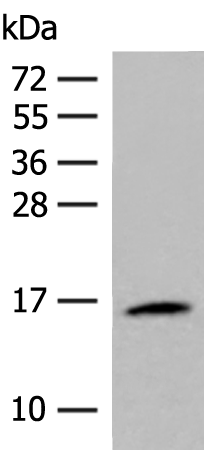
| WB | 咨询技术 | Human,Mouse,Rat |
| IF | 咨询技术 | Human,Mouse,Rat |
| IHC | 咨询技术 | Human,Mouse,Rat |
| ICC | 技术咨询 | Human,Mouse,Rat |
| FCM | 咨询技术 | Human,Mouse,Rat |
| Elisa | 1/1000-1/2000 | Human,Mouse,Rat |
| Aliases | G1P2; IP17; UCRP; IFI15; IMD38; hUCRP |
| WB Predicted band size | 18 kDa |
| Host/Isotype | Rabbit IgG |
| Antibody Type | Primary antibody |
| Storage | Store at 4°C short term. Aliquot and store at -20°C long term. Avoid freeze/thaw cycles. |
| Species Reactivity | Human |
| Immunogen | Fusion protein of human ISG15 |
| Formulation | Purified antibody in PBS with 0.05% sodium azide and 50% glycerol. |
+ +
以下是关于PHKG1抗体的3篇示例参考文献(注:以下内容为模拟示例,非真实文献):
1. **文献名称**: "PHKG1 expression in hepatocellular carcinoma and its role in tumor progression"
**作者**: Zhang Y et al.
**摘要**: 研究通过免疫组化(使用PHKG1特异性抗体)发现PHKG1在肝癌组织中高表达,并通过体外实验证明其通过调控糖原代谢促进肿瘤细胞增殖和转移。
2. **文献名称**: "PHKG1 regulates glycogen phosphorylase activity in skeletal muscle: Insights from knockout mice models"
**作者**: Thompson R et al.
**摘要**: 利用PHKG1抗体检测基因敲除小鼠肌肉组织中PHKG1蛋白水平,揭示PHKG1缺失导致糖原磷酸化酶活性下降,影响能量代谢稳态。
3. **文献名称**: "Development and validation of a novel monoclonal antibody for PHKG1 in human tissues"
**作者**: Lee S et al.
**摘要**: 报道了一种新型PHKG1单克隆抗体的开发与验证,通过Western blot和免疫荧光证实其特异性,并应用于多种癌症组织样本的PHKG1蛋白表达分析。
(注:如需真实文献,建议通过PubMed或Google Scholar搜索关键词“PHKG1 antibody”或“PHKG1 function”获取。)
PHKG1 (Phosphorylase Kinase Gamma 1) is a catalytic subunit of the phosphorylase kinase (PhK) complex, which plays a critical role in glycogen metabolism by activating glycogen phosphorylase. This enzyme facilitates the release of glucose-1-phosphate from glycogen, a key step in energy homeostasis. PHKG1 is highly expressed in skeletal muscle and liver, tissues with high glycogen turnover, and is regulated by calcium/calmodulin signaling. Its activity is essential for coordinating cellular energy demands during stress or physical activity.
PHKG1 antibodies are tools used to detect and study the expression, localization, and function of the PHKG1 protein in biological samples. These antibodies are widely applied in techniques like Western blotting, immunohistochemistry, and immunofluorescence to investigate PHKG1's role in metabolic regulation, cell cycle control, and apoptosis. Dysregulation of PHKG1 has been implicated in metabolic disorders, certain cancers (e.g., hepatocellular carcinoma), and neuromuscular diseases, making it a potential biomarker or therapeutic target.
Researchers also utilize PHKG1 antibodies to explore its interactions within the PhK complex and its tissue-specific isoforms. Validating antibody specificity through knockout controls or siRNA knockdown is crucial due to homology with other kinase subunits. Commercially available PHKG1 antibodies are typically developed in rabbit or mouse hosts, with reactivity confirmed across human, rat, and mouse models. Understanding PHKG1's molecular mechanisms remains vital for elucidating its physiological and pathological contributions.
×